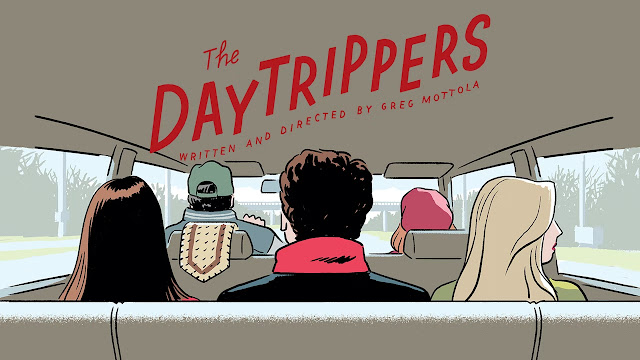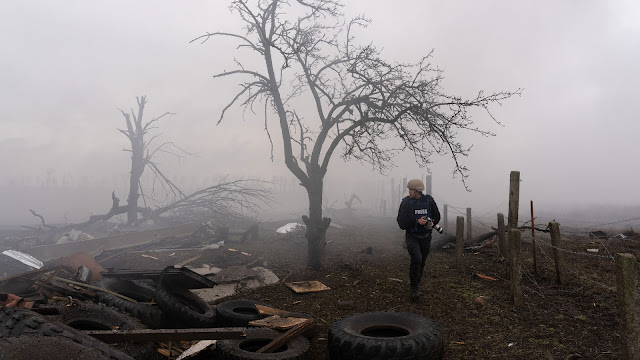Peripheral Love in The Daytrippers
by Zac Bentz
This article contains minor spoilers for Greg Mottola's 1996 masterpiece. You're welcome to keep reading even if you haven't seen it, but if it were up to me, you'd go and watch it first!
It's genuinely strange to me that Greg Mottola's 1996 debut, The Daytrippers, doesn't have a wider audience. I feel like it's such a quintessential slice of 1990s urban indie storytelling, and even a cursory glance at the more successful independent cinema of the 2000s proves that its impact among the few people who have seen it is pretty major -- it's like Little Miss Sunshine, The Royal Tenenbaums, and Pieces of April got together for coffee on a chilly day in November. And the guy directed Superbad!! Come on!!!!
I'm firmly in the camp that this is a story about love, even if the central love story between Hope Davis's Eliza and Stanley Tucci's Louis doesn't exactly pan out in the way we expect, even for a film that's essentially about a couple breaking up. To quickly recap the plot -- a young woman finds a letter in her husband's jacket pocket that leads her to believe he's having an affair, so her entire family (plus her sister Jo's boyfriend, baby Liev Schreiber as the original podcaster bf) piles into their station wagon and makes their way into the city to confront him.
Eliza and Louis are doomed from the start, but this love story was never supposed to be theirs. In fact, the ending proves that going their separate ways is the best thing for both of them -- regardless of how you feel the film handles its twist (which I won't reveal), you kind of can't help but feel relieved for both of them. Louis has the freedom to explore a part of himself he's never been able to explore, and Eliza... well, we'll get there.
What I love about this movie is that it's not about Louis and Eliza. I mean, it is, but it's not. It's about family. It's about the people you literally have no choice but to care about, no matter what it does to you. It's about why we love each other and all the different ways we show it, and how sometimes the only way you can love someone is by hating them first. It's about how hungry we are all for our lives to mean something more than one person, one place, one thing.
To prove this, I wanna unpack some of my favorite love stories in The Daytrippers, and try to figure out why, for a film about a couple falling out of love, it's one of my favorite love stories ever made.
1. Carl and Rita
The relationship between your significant other and your parents is inherently hilarious. Like, it's such a weird minefield to have to navigate. You have to simultaneously introduce a new person into an established group dynamic that's literally been developing since you were born, sell them on why this person in particular is worth opening up to, coach your partner through navigating multiple generations worth of judgement, and wrap your head around the fact that, no matter what actually goes down under their roof, your parents assume that y'all probably be fuckin'.
This is such a brilliant dynamic to explore in a movie that traps a family in a car during a crisis and forces them to re-examine their relationships with one another. From the first scene they share together, it's clear that Rita likes Jo's boyfriend Carl a little too much. Not in any sort of weird, sexual way, but in the sense that Carl (or at least the pretentious, philosophical front he puts on to impress Eliza and Jo's parents) represents everything Rita wishes Jo could be.
Naturally, this creates some tension -- Jo's relationship with her mother is already strained, and not only is the version of Carl that Rita seems to be falling for not really Carl, it's an amalgam of all his worst traits, at least through Jo's eyes. It's a fantastic example of Mottola's understanding that love can't really be insular. There's always some give and take. Loving one person can mean devoting less attention to someone else who deserves it just as much. Changing yourself to better suit someone else can alienate the people who already love you for who you are. And Carl and Rita's strictly platonic romance, in addition to being probably the funniest dynamic in the film with some of the best comedic chemistry I've ever seen, somehow encapsulates all of this perfectly.
2. Leon and Ronnie
The Daytrippers is a vital contribution to one of the longest-standing, most reliable cinematic traditions there is -- the New York Movie. The Capital of the World has been portrayed thousands upon thousands of times in thousands upon thousands of styles -- it's been a pastel storybook wonderland; a crumbling bed of corruption and brutalism; a slick, noirish metropolis -- any way you could style a city, New York has embodied it three times over. But somehow, Mottola's New York feels more lived-in and honest than nearly any other interpretation of the city I've seen, and I think that's because of how much attention he pays to peripheral characters.
Their quest to confront Louis brings the Malones face-to-face with a roster of side characters that somehow feel both larger-than-life and heart-wrenchingly real. We see only the narrowest glimpses into their lives, but it's clear that there's an entire separate film behind each and every one of them -- a pair of late-middle-aged sisters bickering over how to divide their dead mother's furniture and medications; Louis's misogynistic co-workers who brag about sexual exploits while talking down on the women they were involved with for doing the same thing; the snobbish attendees of a book release party; and, my favorite of the bunch, a tragically lovable father-son duo with a backstory more complex and interesting than a film this simple should ever be expected to provide.
When Rita suddenly faints on the sidewalk, the gang knocks on the nearest door they can find and quickly rush her inside. They find themselves in the apartment of a kid named Ronnie, a quiet twenty-something with thick dark hair and a face shrouded under large glasses and a black baseball cap. His father rushes in, and amid all the confusion, demands the Malones leave, but Ronnie lets them sit. As soon as they're settled, Leon apologizes for his hasty outburst and offers them food and a spot for Rita to rest for a moment.
Over a meal, they all begin chatting, and we learn that Ronnie's actually sheltering his father, who's facing significant consequences for not paying his alimony. At one point, Ronnie's mother calls, and suddenly we've been given this tiny glimpse into the lives of two people who care deeply for one another but for whom circumstances have warped their relationship into something it was never meant to be -- but nevertheless, they still love and care for each other, both emotionally and physically (Ronnie shelters his father, despite and as a direct result of Leon's failure to provide for him). We only ever see this through Ronnie covering for his father while on the phone, and the way they work as a unit, virtually effortlessly, to make sure the Malones have everything they need. It's a New York story nested within a New York story that celebrates parental love and serves as a perfect counterpoint to Jo and Carl's relationship with Rita, but also as a parallel to the way Eliza's family came together to support her in the first place.
3. Eliza and Jo
This is the most important dynamic on the list, in my opinion. Through all the conflicts the Malones face on their journey, all the relationships that are broken and healed, all the jealousy and resentment and tension, as a result of all of it... Eliza and Jo only become closer as sisters. As Jo begins to fear Carl may not be who she'd hoped he was and Eliza comes to terms with the building evidence that Louis is cheating on her, as their parents begin to fight and Jo finds herself drawn to a charismatic man at the climactic book release event, the two sisters realize that every conflict they've faced gives them one more point of connection. They never say this out loud, but watching them react to parallel situations in their own lives, and the things they say to each other during quiet moments on benches, sharing cigarettes and lamenting Rita's comments about how they dress for the cold, we understand how badly they need each other, and how cathartic it is to finally realize it. And the last shot of the movie is just the two of them, slowly disappearing as they run further and further down the sidewalk toward some unknown shared future, arms around each other's shoulders, broken but together.
To end, I'll leave you with my favorite Letterboxd review. Please give The Daytrippers a chance. Even if you're not a fan of Superbad and are hesitant about checking out more of Mottola's work, I assure you, they're nothing alike. This is truly one of the most honest, lovely films out there, and I'll die happy if I know at least one person watched it because of this piece <3







Comments
Post a Comment